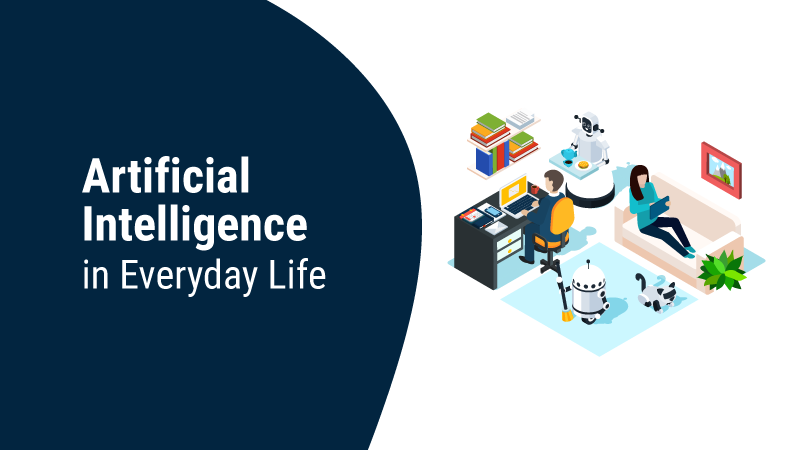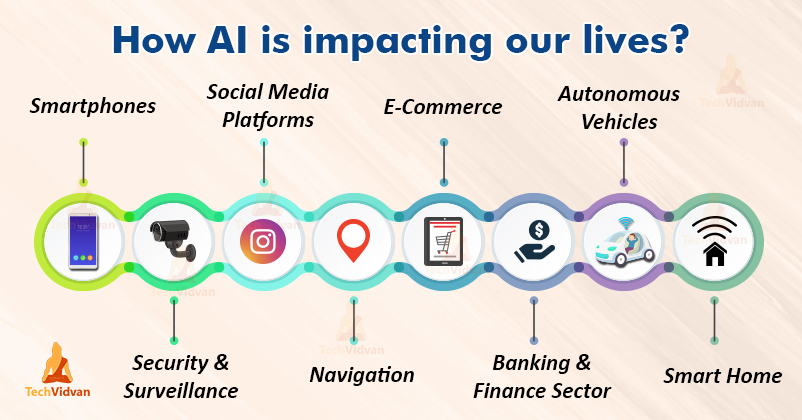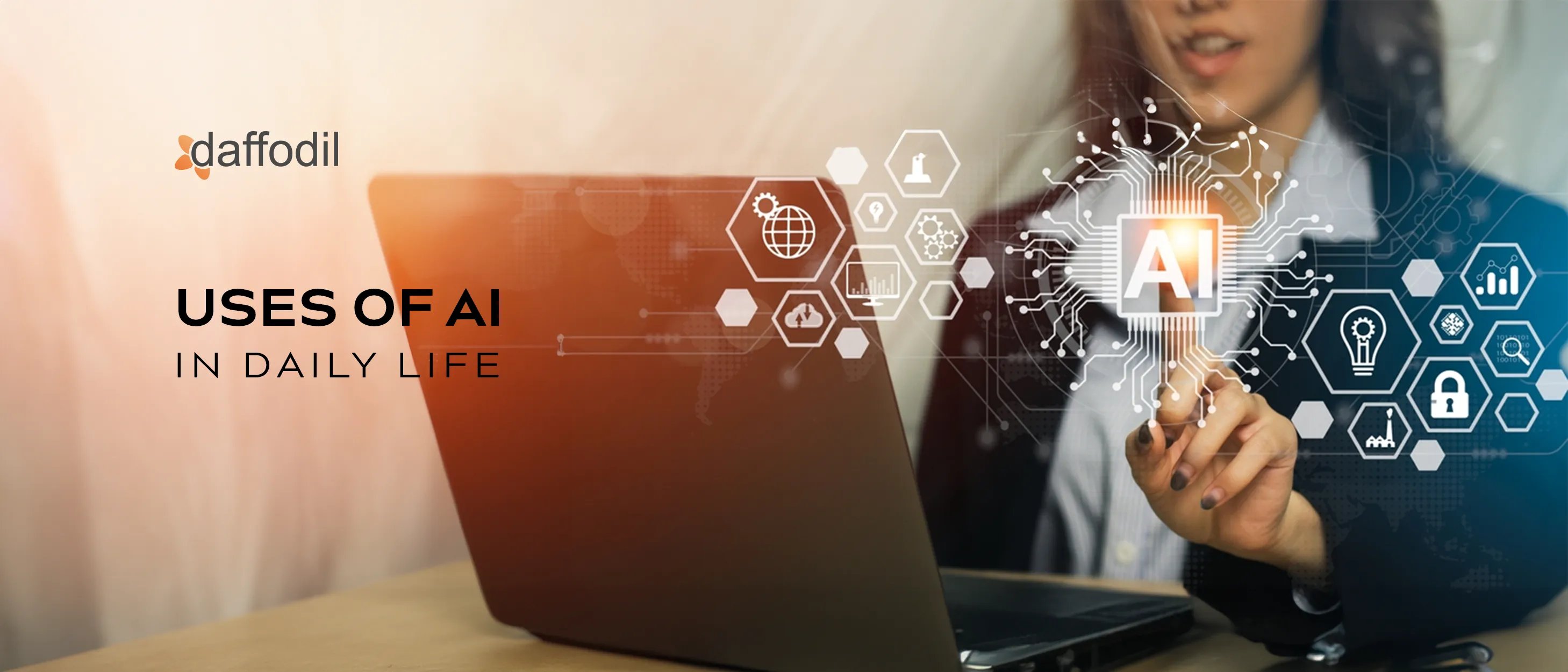Artificial Intelligence (AI) is everywhere. It’s becoming a part of our daily routines.
From smartphones to smart homes, AI impacts our lives in many ways. In recent years, AI has moved beyond research labs and tech companies. It’s now in our homes, our cars, and even in our pockets. AI helps with tasks we do daily, making life easier and more efficient.
Whether it’s voice assistants helping us set reminders or personalized recommendations on streaming services, AI is at work. It learns our habits and preferences, adapting to meet our needs. This integration of AI into everyday life opens up many new possibilities. It’s not just for tech enthusiasts; it’s for everyone. Let’s explore how AI is shaping our daily experiences.

Credit: www.claysys.com
Smart Home Devices
Artificial Intelligence has integrated deeply into our daily lives. One prominent area is smart home devices. These devices offer convenience, efficiency, and security. Let’s explore some key types of smart home devices.
Voice Assistants
Voice assistants like Amazon Alexa and Google Assistant are popular. They help you control various home devices with simple voice commands. You can ask them to play music, set reminders, or check the weather. These assistants can also control lights, thermostats, and security systems. They make everyday tasks easier and more enjoyable.
Smart Thermostats
Smart thermostats adjust your home’s temperature automatically. They learn your schedule and preferences. This helps save energy and money. Brands like Nest and Ecobee are common. You can control them using your smartphone. They ensure your home is always comfortable.
Home Security Systems
Home security systems have become smarter with AI. They include smart cameras, doorbells, and alarms. These devices can recognize faces and detect unusual activities. You receive instant alerts on your phone. This keeps your home safe, even when you are away. Companies like Ring and Arlo offer reliable options.
Personal Assistants
Artificial Intelligence (AI) has made its way into our daily lives in various forms. One of the most useful applications is personal assistants. These AI-driven tools can help manage daily tasks with ease. Let’s explore some key areas where personal assistants make a difference.
Scheduling And Reminders
Personal assistants like Siri, Google Assistant, and Alexa can manage your scheduling. They keep track of meetings, appointments, and events. You can simply ask your assistant to add an event to your calendar.
For example, you can say, “Hey Siri, schedule a meeting with John at 2 PM tomorrow.” The assistant will add this to your calendar and send you a reminder. This is especially useful for busy professionals.
Email Management
Managing emails can be time-consuming. Personal assistants can help with email management. They can sort your emails into different categories, mark important messages, and even draft replies.
For example, Gmail’s AI can categorize emails into Primary, Social, and Promotions tabs. This keeps your inbox organized. You can also use voice commands to dictate replies.
Task Automation
Personal assistants can automate repetitive tasks. This saves you time and effort. For instance, you can set routines for daily activities.
Imagine you want to start your day with a weather update, your schedule, and the latest news. You can create a routine in Google Assistant. Just say, “Hey Google, good morning.” The assistant will give you the information you need.
Another example is automating smart home devices. You can use Alexa to control lights, thermostats, and other devices. This makes your home more efficient and convenient.
Healthcare Innovations
Artificial Intelligence (AI) is transforming healthcare. From early diagnosis to personalized treatments, AI helps in numerous ways. Let’s explore some key applications.
Wearable Health Monitors
Wearable health monitors are gaining popularity. They track vital signs like heart rate, blood pressure, and oxygen levels. These devices provide real-time data to users and doctors. This helps in early detection of health issues.
For instance, a smartwatch can alert you to irregular heartbeats. This allows for quick medical intervention. These devices also help in managing chronic conditions. By monitoring daily activities, they provide insights into health trends.
| Device | Function |
|---|---|
| Smartwatch | Heart rate, steps, sleep patterns |
| Fitness Band | Blood pressure, calories burned |
| ECG Monitor | Heart rhythm, stress levels |
Virtual Health Assistants
Virtual health assistants are AI-powered chatbots. They provide medical advice and reminders for medication. These assistants answer health-related queries and schedule appointments.
For example, a virtual assistant can remind you to take your medicine. It can also suggest lifestyle changes based on your health data. These assistants are available 24/7, making healthcare more accessible.
- Medication reminders
- Appointment scheduling
- Health tips and advice
Predictive Diagnostics
Predictive diagnostics use AI to analyze medical data. This helps in predicting diseases before symptoms appear. It uses algorithms to identify patterns in patient data.
For example, AI can predict the risk of diabetes by analyzing health records. This allows for early intervention and better treatment plans. Predictive diagnostics improve patient outcomes and reduce healthcare costs.
- Data analysis for disease prediction
- Early intervention strategies
- Personalized treatment plans
Transportation Enhancements
Artificial Intelligence (AI) has transformed many aspects of our lives. One significant area is transportation. AI enhances safety, efficiency, and convenience in this sector. From autonomous vehicles to traffic management systems and ride-sharing apps, AI impacts how we travel daily.
Autonomous Vehicles
Autonomous vehicles, or self-driving cars, use AI to navigate roads. They rely on sensors and cameras. These devices collect data from the environment. AI processes this data to make driving decisions. This technology reduces human errors and enhances road safety. It also improves fuel efficiency by optimizing driving patterns.
Traffic Management Systems
AI-powered traffic management systems help manage road congestion. These systems analyze real-time traffic data. They predict traffic patterns and adjust signals accordingly. This reduces traffic jams and improves travel times. Commuters benefit from smoother and faster journeys.
Ride-sharing Apps
Ride-sharing apps like Uber and Lyft use AI algorithms. These algorithms match riders with drivers efficiently. AI predicts demand and suggests optimal routes. This reduces wait times and ensures faster pickups. Users enjoy convenient and cost-effective transportation options.
Shopping And E-commerce
Artificial Intelligence enhances shopping and e-commerce experiences. It recommends products, personalizes ads, and manages customer service through chatbots. AI analyzes data to predict trends and improve inventory management.
Artificial Intelligence (AI) has become a part of our everyday lives. In shopping and e-commerce, AI makes the experience smoother. It helps both buyers and sellers in many ways. Let’s explore some key applications of AI in this field.Personalized Recommendations
AI learns from your shopping habits. It looks at your past purchases and searches. Then, it suggests products you might like. This saves you time. You get to see items that fit your taste. It feels like the store knows you well. You might even find things you didn’t know you wanted.Chatbots And Customer Service
AI-powered chatbots are common on shopping websites. They answer your questions quickly. You don’t have to wait for a human agent. Chatbots can help you find products. They can also provide information about your order. If you have a problem, they can guide you. This makes customer service more efficient.Inventory Management
AI helps stores manage their stock better. It predicts which products will be popular. This way, stores can order the right amount of stock. They avoid running out of items. AI also detects patterns in sales. It helps stores plan for busy times. This means fewer empty shelves and happier customers. “`
Credit: techvidvan.com
Education And Learning
Artificial Intelligence (AI) is changing education and learning. It makes learning more personalized and effective. AI helps students and teachers in many ways. It saves time and improves the learning experience.
Adaptive Learning Platforms
Adaptive learning platforms use AI to tailor lessons to each student. They analyze a student’s strengths and weaknesses. Then, they provide customized content to help them improve. This makes learning more efficient. Students get the help they need when they need it.
Virtual Tutors
Virtual tutors are AI-powered tools that assist students. They answer questions and explain difficult concepts. These tutors are available 24/7. They provide instant feedback and support. This helps students learn at their own pace. They don’t have to wait for a teacher’s help.
Language Translation
AI-based language translation tools help students learn new languages. They translate text and speech in real-time. This makes it easier for students to understand foreign languages. They can practice speaking and listening skills with these tools. This improves their language proficiency.
Entertainment And Media
Artificial Intelligence has transformed the Entertainment and Media industry. AI enhances user experience, making entertainment more personalized and immersive. From suggesting your next favorite movie to creating unique art pieces, AI is everywhere.
Content Recommendation Engines
Content recommendation engines are a key AI application in entertainment. These systems analyze user behavior to suggest movies, music, and books. Platforms like Netflix and Spotify use AI to recommend content based on your preferences. This personalization keeps users engaged and satisfied.
- Netflix: Recommends shows based on viewing history.
- Spotify: Suggests songs and playlists tailored to your taste.
- Amazon: Recommends books and movies based on past purchases.
Ai-generated Art And Music
AI is not just consuming media; it is also creating it. AI-generated art and music are becoming popular. Artists and musicians use AI to produce unique pieces. This technology analyzes patterns in existing works to create new, original content.
- Art: AI tools like DeepArt create paintings inspired by famous artists.
- Music: AI composers like Amper Music generate original scores.
- Literature: AI writes poems and short stories.
Virtual Reality Experiences
Virtual Reality (VR) experiences are revolutionized by AI. VR games and simulations use AI to create more realistic and interactive environments. AI enhances the realism of characters and scenarios in VR, making the experience more engaging.
| Application | Description |
|---|---|
| Gaming | AI enhances the realism and complexity of game worlds. |
| Education | AI-driven VR experiences create immersive learning environments. |
| Healthcare | AI and VR combine to simulate medical training scenarios. |
AI’s role in entertainment and media is growing. It enhances user experience, creates new content, and makes virtual experiences more immersive.

Credit: insights.daffodilsw.com
Financial Services
Artificial Intelligence (AI) has made significant strides in various fields. One of the most impactful areas is financial services. AI enhances efficiency, accuracy, and security. Let’s explore how AI applications are transforming financial services.
Fraud Detection
AI plays a vital role in detecting fraud. It analyzes large amounts of data quickly. AI identifies unusual patterns and flags suspicious activities. This helps prevent financial losses. It also enhances the security of financial transactions. Banks and financial institutions rely on AI to protect their customers.
Automated Trading
AI-driven algorithms are used in automated trading. These algorithms analyze market data in real-time. They make trading decisions based on trends and patterns. This leads to faster and more accurate trades. Automated trading reduces human errors. It also increases the efficiency of financial markets.
Personal Finance Management
AI helps individuals manage their finances better. Personal finance apps use AI to track spending habits. They provide insights and suggestions for saving money. AI also assists in budgeting and financial planning. Users receive personalized financial advice. This helps them make informed financial decisions.
Workplace Efficiency
Artificial Intelligence (AI) is transforming the workplace. AI helps in various tasks, making work more efficient and productive. Here are some ways AI is enhancing workplace efficiency.
Automated Administrative Tasks
AI can handle many administrative tasks. These include scheduling meetings, managing emails, and data entry. AI-powered virtual assistants like Siri and Alexa can schedule appointments and set reminders. This frees up time for employees to focus on more important tasks.
Another example is AI in customer service. Chatbots can answer common questions and provide information quickly. This reduces the workload on human employees and ensures customers get quick responses.
Ai-powered Analytics
AI helps in analyzing vast amounts of data quickly and accurately. This is essential for making informed business decisions. AI tools can find patterns and trends in data that humans might miss. This helps companies stay competitive and make better strategic choices.
For example, AI can analyze sales data to identify which products are performing well. It can also predict future sales trends, helping businesses plan better. AI-powered analytics tools are a game-changer for data-driven decision-making.
Enhanced Collaboration Tools
AI improves collaboration tools, making team communication easier. Tools like Slack and Microsoft Teams use AI to provide smart suggestions and automate routine tasks. AI can also help in managing project timelines and assigning tasks based on employees’ skills.
AI can translate messages in real-time, breaking language barriers in global teams. This ensures smooth communication and collaboration among team members, regardless of their location.
| AI Applications | Benefits |
|---|---|
| Automated Administrative Tasks | Time-saving, efficiency |
| AI-Powered Analytics | Data accuracy, informed decisions |
| Enhanced Collaboration Tools | Improved communication, better teamwork |
Frequently Asked Questions
How Is Ai Used In Everyday Life?
AI enhances daily life through smart assistants, personalized recommendations, and improved security. It simplifies tasks and boosts efficiency.
What Are Examples Of Ai In Daily Activities?
AI powers voice assistants, smart home devices, and personalized content. It streamlines routines and enhances convenience.
How Does Ai Improve Home Security?
AI-driven cameras and alarms detect unusual activities and notify users. This ensures quick and effective responses.
Can Ai Assist In Healthcare At Home?
Yes, AI monitors health data and offers virtual consultations. It helps in managing health conditions effectively.
Conclusion
Artificial Intelligence makes daily tasks easier and more efficient. From virtual assistants to smart home devices, AI helps in many ways. It improves healthcare, enhances shopping experiences, and boosts productivity. Simple AI tools assist in learning and work. AI’s presence in daily life continues to grow.
Embrace these advancements for a more convenient life. Understanding AI’s applications can lead to better use of technology. Stay informed and enjoy the benefits of AI. It’s shaping the future, one innovation at a time.
1 thought on “Applications of Artificial Intelligence in Daily Life: Transform Your World”